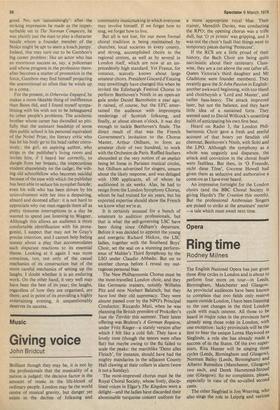Music
Giving voice
John Bridcut
Brilliant though they may be, it is not by the professionals that the musicality of a nation is judged; the decisive factor is the amount of music in the life-blood of ordinary people. London may be the world centre of musical gravity, but danger yet exists in the decline of folksong and
community musicmaking in which everyone may involve himself. If we forget how to sing, we forget how to live.
But all is not lost, for our more formal choral tradition is being maintained by churches, local societies in every county, and strong, accomplished choirs in the regional centres, as well as by several in London itself, which are now at an unprecedently high standard. Yet France, for instance, scarcely knows about large amateur choirs. President Giscard d'Estaing may unwittingly have changed this when he invited the Edinburgh Festival Chorus to perform Beethoven's Ninth in an open-air gala under Daniel Barenboim a year ago. It rained, of course, but the EEC entertained the audience with impromptu renderings of Scottish folksong, and finally, at about eleven o'clock, it was dry enough to tackle Beethoven's finale. The direct result of that was the French Government's invitation to the Chorus Master, Arthur Oldham, to form an amateur choir of two hundred, to work with the Orchestre de Paris. Ruffled feathers abounded at the very notion of un anglais being let loose in Parisian musical circles, but Oldham advertised for singers, unsure about the likely response, and was deluged with 1500 applicants, all of whom he auditioned in six weeks. Alas, he had to resign from the London Symphony Chorus, whom he had trained for six years, but his exported expertise should show the French we know what we're at.
It is certainly unusual for a bunch of amateurs to audition professionals, but that is what the self-governing LSC have been doing since Oldham's departure. Before it was decided to appoint the young and energetic Richard Hickox, the LSC ladies, together with the Southend Boys' Choir, set the seal on a stunning performance of Mahler's Third Symphony by the LSO under Claudio Abbado. But on to another chorus before I reveal my outrageous personal bias.
The New Philharmonia Chorus must be the Most-travelled London choir, and they like Germanic trainers, notably Wilhelm Pitz and now Norbert Balatsch, but they have lost their old supremacy. They were almost passed over by the NPO's Principal Conductor. Riccardo Muti, when he was planning the British premiere of Prokofiev's Ivan the Terrible this summer. Their latest offering was Brahms's A German Requiem, under Fritz Rieger—a stately version after which I felt like a cold fish. They have a lovely tone (though the tenors were often flat) but maybe owing to the flu failed to scale the peaks: the marchlike 'Denn alles Fleisch', for instance, should have had the mighty mandarins in the adjacent County Hall clawing at their collars in alarm (were it not a Sunday).
The most-improved chorus must be the Royal Choral Society, whose lively, disciplined voices in Elgar's The Kingdom were a delight—and the ladies have discarded their abominable turquoise concert uniform for
a more appropriate royal blue. Their trainer, Meredith Davies, was conducting the RPO; the opening chorus was a trifle dull, but '0 ye priests' was gripping, and it was not the choir's fault that things went to temporary pieces during Pentecost'.
If the RCS are a little proud of their history, the Bach Choir are being quite narcissistic about their centenary. Classwise, they are a cut above the rest (after all, Queen Victoria's third daughter and Mr Gladstone were founder members). They recently gave the St John Passion in English: another awkward beginning, with too bland and choirboyish a 'Lord and Master', and rather bass-heavy. The attack improved later, but not the balance, and they have little idea of a sustained forte. They seemed used to David Willcock's unsettling habit of anticipating his own first beat.
Heard on Radio 3, the London Philharmonic Choir gave a fresh and zestful account of that hoary yet fiendish old chestnut, Beethoven's Ninth, with Solti and the LPO. Although the symphony as a whole was ungainly and disparate, the attack and conviction in the choral finale were faultless. But then, in '0 Freunde, nicht diese Tone', Gwynne Howell had given them as seductive and authorative a come-on as I have ever heard.
An impressive fortnight for the London choirs (and the BBC Choral Society is giving Haydn's The Creation this month). But the professional Ambrosian Singers are poised to strike at the amateurs' nectar —a tale which must await next time.


































 Previous page
Previous page